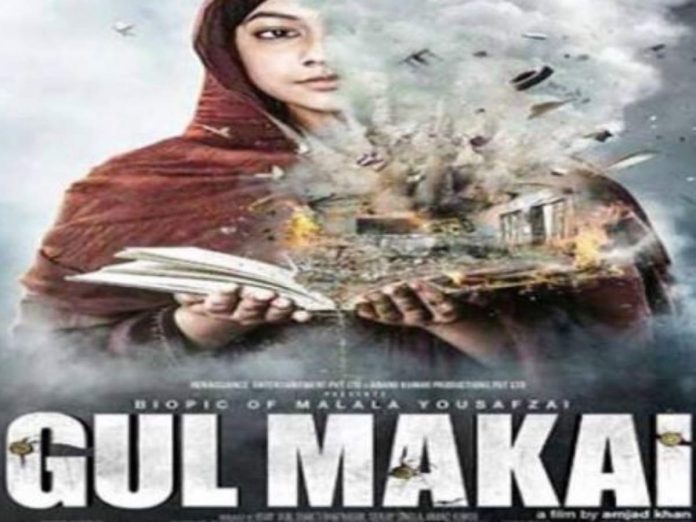Dr. Jayantilal Gada and Tekno Films’ Gul Makai (UA) is the story of Nobel Peace Prize winner Malala Yousafzai. The film is set in strife-torn Pakistan.
Malala Yousafzai (Reem Shaikh) lives with her father (Atul Kulkarni), mother (Divya Dutta) and two little brothers, Khushal (Khushmeet Gill) and Atal (Dhwij Mehta), in the SWAT valley of Pakistan. Her grandmother (Kamlesh Gill) comes visiting them.
The Talibans have made life hell for the liberal Pakistanis in SWAT valley as they don’t want girls to be educated and want Muslims to shun music and entertainment. Ziauddin Yousafzai is the forward-thinking principal of Khushal School. His school-going daughter, Malala, is also independent in her thinking. In fact, Malala writes a newspaper column, condemning the atrocities and murders of the Talibans. Since she writes under the pen name of Gul Makai, Gul becomes an overnight star.
Conditions worsen in the valley so much that schools are forced to close down and ultimately, the area where the Yousafzais live has to be evacuated. However, Ziauddin Yousafzai, with like-minded people, continues his tirade against the Talibans. Once people return to the valley and schools reopen, the Talibans target Malala and shoot at her. She is hospitalised and saved. She ultimately becomes a young star who dared to stand up against international terrorists. She is given the Nobel Peace Prize and receives a number of international honours.
The film is based on the life of Malala but only till she is shot at by the Talibans. Her rise to stardom is conveyed through only a commentary (in Shabana Azmi’s voice) but that should’ve been an important part of the drama.
Bhaswati Chakrabarty’s screenplay is written in a docu-drama style and will, therefore, appeal more to the festival circuit audience. Although it is a human interest story, the screenplay fails to get the emotional part of the story to the fore. Consequently, the drama becomes more of a recounting of events rather than a replay of events. This is the reason that the impact of the screenplay on the viewers is not what it should’ve been. In other words, the viewer sees the drama unfolding, without really feeling like a part of it. Bhaswati Chakrabarty’s dialogues are so-so.
Reem Shaikh does a fairly nice job as Malala Yousafzai. Atul Kulkarni plays Ziauddin Yousafzai effectively but his dialogue delivery does not sound like that of a Muslim. Divya Dutta is excellent in the role of Toor Pekai Yousafzai. Kamlesh Gill is quite nice as Malala’s grandmother. Abhimanyu Singh is okay as Hakimullah Mehsud. Arif Zakaria lends fine support as Sufi Mohammed. Mukesh Rishi is effective as Radio Mulla Fazalullah. Om Puri has a tiny role as General Kayani and he is okay. Sharib Hashmi is alright as Ataullah Khan. Ganesh Yadav (as Gen. Sanaullah Khan) and Ravi Kale (as the army officer) lend average support. Pankaj Tripathi is so-so in a tiny role as Beitullah Mehsud. Amjad Khan is okay as Zahid Khan. Chandra Shekhar Dutta (as Muslim Khan), Prateek Parmar (as Pakistani army captain Atif Sayyed), Ajay Chourey (as Musa Khankhel), master Khushmeet Gill (as Khushal Yousafzai), master Dhwij Mehta (as Atal Yousafzai) and the others lend ordinary support.
Amjad Khan’s direction is so-so. His music is quite melodious. Lyrics (by Amjad Khan and Bhaswati Chakrabarty) are appropriate. Amar Mohile’s background music could’ve been more impactful. Camerawork (by Madhu S. Rao and Javed Ahtasham Shaikh) is okay. Amjad Khan’s action designing and Parvez Khan’s action scenes are ordinary. Ramen Das’ production designing is so-so. Pravin B. Angre’s editing should’ve been sharper.
On the whole, Gul Makai is more a film for the festival circuit audience than a commercial fare. It will, therefore, go largely unnoticed at the box-office.
Released on 31-1-’20 at Inox Metro (daily 1 show) and other cinemas of Bombay by PEN Marudhar Cine Entertainment. Publicity & opening: weak. …….Also released all over.





























